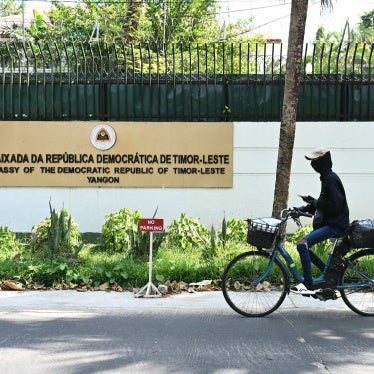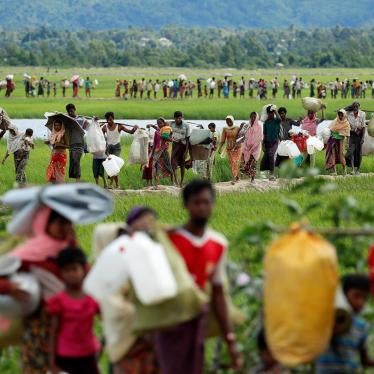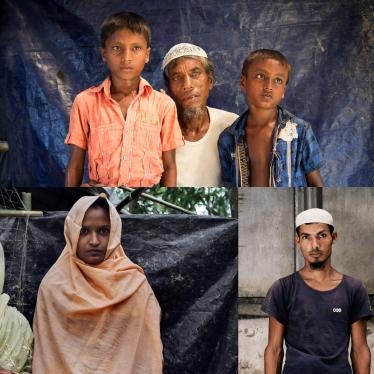Dear Ambassador,
We are writing to you to express our support for the letter sent to the President of the UN Security Council on December 5, 2014 signed by ten Council members, urging formal Council discussion of the human rights situation in North Korea without prejudice to the item on non-proliferation.[1]
As you know, the UN Human Rights Council-created Commission of Inquiry on the human rights situation in the Democratic People’s Republic of Korea (DPRK) concluded that “the long-standing and ongoing patterns of systematic and widespread violations” of human rights in the DPRK “meet the high threshold for proof of crimes against humanity” and that their nature, scale, and gravity “reveal a state that does not have any parallel in the contemporary world.”[2] The crimes entail “extermination, murder, enslavement, torture, imprisonment, rape, forced abortions and other sexual violence, persecution on political, religious, racial and gender grounds, the forcible transfer of populations, the enforced disappearance of persons and the inhumane act of knowingly causing prolonged starvation.”[3]
On the basis of these findings, the Commission of Inquiry concluded that these decades-long state policies must be addressed and that “the international community must accept its responsibility to protect the people of the Democratic People’s Republic of Korea from crimes against humanity, because the Government of the DPRK has manifestly failed to do so.”[4]
There is, moreover, growing international recognition of the need for Security Council engagement on the human rights situation in the DPRK. The most recent resolutions of the UN Human Rights Council and the UN General Assembly Third Committee, the latter of which was adopted with 111 UN Member States voting in favor, call on the UN Security Council “to consider the relevant conclusions and recommendations of the commission and take appropriate action to ensure accountability,” including through possible referral of the North Korean situation to the International Criminal Court.
The Commission of Inquiry noted that “the peaceful efforts taken so far have proved inadequate as the Democratic People’s Republic of Korea has defied the united stance of the international
community as embodied in the General Assembly and its Human Rights Council.”[5] The Commission further concluded that North Korea’s ongoing “open defiance of the United Nations makes this a case where decisive, yet carefully targeted action should be taken by the Security Council in support of the ongoing efforts of the remainder of the United Nations system.”[6] Indeed, the North Korean government’s bellicose response to the latest vote in the UN General Assembly’s human rights committee—characterizing it as “hostile” and “naturally compelling the army and the people of the DPRK to launch the toughest counteraction”—only further supports the Commission’s conclusion that the UN Security Council’s consideration of the human rights situation is essential.[7]
Of course, when the General Assembly considers the Third Committee resolution later this month in Plenary, we urge and indeed expect States to maintain their support for it and, in the case of those that have abstained, to vote in favor of it. The General Assembly resolution addresses a number of ongoing and serious human rights concerns in the DPRK identified by the Commission of Inquiry, the Human Rights Council, and its special procedures; and it directs recommendations to a broad range of parties, including the government of the DPRK, all UN Member States, UN intergovernmental bodies, the UN Secretariat and agencies, and other stakeholders. The General Assembly resolution confirms that all of these actors have a role to play in supporting the improvement of the human rights situation in the DPRK and provides important guidance to them in this regard. It also welcomes human rights dialogue with the DPRK, which the Commission of Inquiry recommended should be pursued alongside accountability measures.
At the same time, as outlined above, the Commission of Inquiry underscores the urgent need for the Security Council to consider the human rights situation in the DPRK as part of its agenda. To this end, we note that the Commission of Inquiry’s report was shared with Security Council Member States on April 14, 2014, although the Council has not yet formally discussed it. We therefore agree with the Commission’s conclusion—and that of the ten Council members that signed the December 5 letter — that the UN Security Council should prioritize formal discussion of the human rights situation in North Korea as early as possible, and without further delay. Such a meeting should be open to all Member States given that, as the Commission rightly noted, the responsibility for action lies with the entire international community.
Sincerely,
Amnesty International
Christian Solidarity Worldwide
Citizens’ Alliance for North Korean Human Rights (NKHR)
Committee for Human Rights in North Korea (HRNK)
Freedom House
Human Rights Watch
International Coalition to Stop Crimes Against Humanity in North Korea (ICNK)
International Federation for Human Rights (FIDH)
Jacob Blaustein Institute for the Advancement of Human Rights
[1] Letter dated 5 December 2014 from the representatives of Australia, Chile, France, Jordan, Lithuania, Luxembourg, the Republic of Korea, Rwanda, the United Kingdom of Great Britain and Northern Ireland, and the United States of America to the United Nations addressed to the President of the Security Council, S/2014/872 (5 December 2014).
[2] Report of the detailed findings of the commission of inquiry on human rights in the Democratic People’s Republic of Korea, UN Doc. A/HRC/25/CRP.1 (7 February 2014) (Commission of Inquiry report), paras 1216 and 1211.
[3] Report of the commission of inquiry on human rights in the Democratic People’s Republic of Korea, UN Doc. A/HRC/25/63 (Commission of Inquiry main findings), para. 76.
[4] Commission of Inquiry report, para. 1217.
[5] Commission of Inquiry report, para. 1208.
[6] Commission of Inquiry report, para. 1208.
[7] Annex to the letter dated 28 November 2014 from the Permanent Representative of the Democratic People’s Republic of Korea to the United Nations addressed to the Secretary-General, p. 1.








